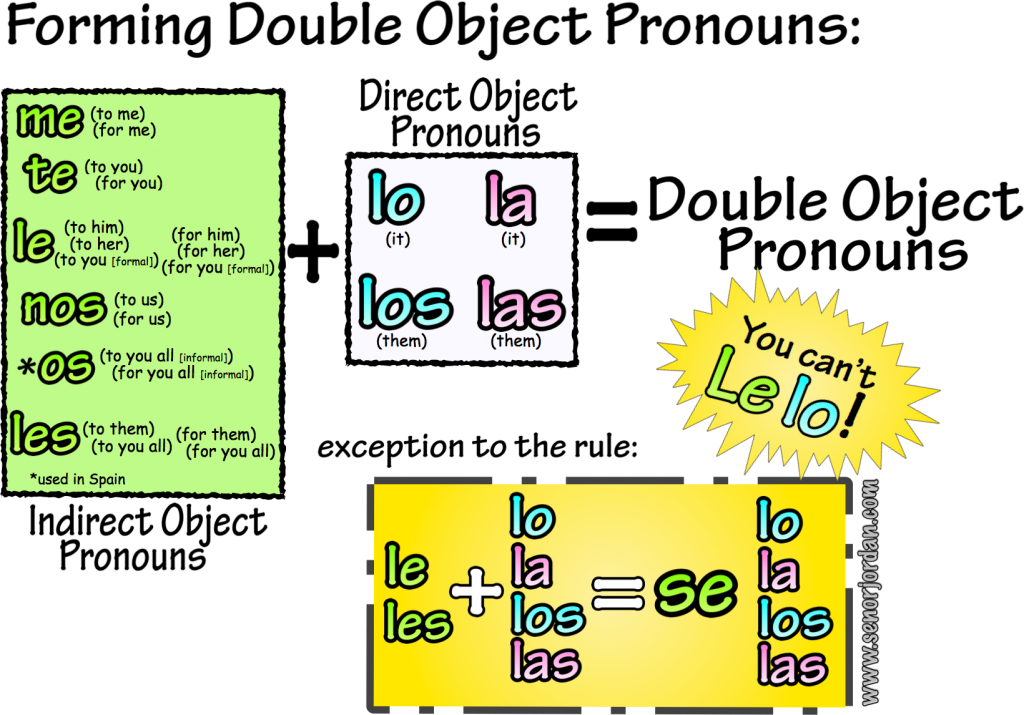In this video lesson we’re going to be practicing Double Object Pronouns.
If you aren’t sure what that means, it means we’ll be using both Direct Object Pronouns and Indirect Object Pronouns in the same sentences.
Leave any questions or comments below!
 Graphic (click to enlarge):
Graphic (click to enlarge):

Vocabulario:
verbos (verbs):
- abrir – to open
- comprar – to buy
- comprender – to understand
- comprenden – they understand
- dar – to give
- das – you give
- dio – s/he gave
- doy – I give
- decir – to say; tell
- dice – s/he says
- diciendo – saying
- digo – I say
- dijo – s/he said/told
- enseñar – to show / to teach
- entender – to understand
- entiendo – I understand
- entiendes – you understand
- estar – to be
- está – s/he is / it is
- estaba – s/he was / it was
- estás – you are
- explicar – to explain
- gustar – “to like” (literally: to be pleasing)
- me gusta(n) – I like
- te gusta(n) – you like
- ir – to go
- leer – to read
- llegar – to arrive
- llevar – to wear / carry / take
- llevaba – s/he used to wear/carry/take
- mandar – to send
- pasar – to pass / happen
- poder – to be able / can
- puede – s/he can
- puedes – you are able / you can
- querer – to want
- quería – I wanted
- quieres – you want
- regalar – to give a gift
- regaló – s/he gave a gift
- robar – to steal
- saber – to know
- sé – I know
- supiste – you knew / you found out
- ser – to be
- tener – to have
- tienes – you have
- tener que – to have [to do something]
- vender -to sell
- ver -to see
- vieron – they saw / you all saw
sustantivos (nouns):
- alguien – someone
- ayer – yesterday
- despacio – slowly
- ¿cuándo? – when?
- ¿dónde? – where?
- el agua -the water
- el hermano – the brother
- el hielo – the ice
- el problema – the problem
- la carta – the letter
- la casa – the house
- la esquina – the corner
- la fiesta – the party
- la lámpara – the lamp
- la maestra – the teacher (female)
- la mamá – the mom
- la noche – the night
- la puerta – the door
- la señora – the lady / mrs. ___
- las botas – the boots
- las joyas – the jewelry
- los alumnos – the students
- los guantes – the gloves
- los hijos – the kids/children
- los verbos – the verbs
- nada – nothing
- una invitación – an invitation
- (una) vez – (one) time
- un libro – a book
otro (other):
- algunos/algunas – some
- “buenas noches” – goodnight
- cada – each; every
- claro que sí – of course
- con – with
- cuando – when
- de – of, from
- después de – after ___
- de vacaciones – on vacation
- en – in, on, at
- entonces – so
- estos/estas – these
- lo que – what
- más – more
- mi(s) – my
- muchos/muchas – a lot (of)
- nuevo/nueva – new
- otro/otra – (an)other
- para – for
- pero – but
- ¿por qué? – why?
- qué – what
- que – that
- sí – yes
- siempre – always
- sólo – only
- su(s) – his, her, your (formal), their, your (plural)
- todavía – still
- y – and
- ya – already
- ya no – no longer
Related video(s):
- Direct Objects (part 1)
- Direct Objects (part 2)
- Direct Objects (part 3)
- Direct Objects SONG (lo,la,los,las)
- Indirect Objects
- Indirect Objects SONG!
- Double Object Pronouns explanation
- Double Object Pronouns Practice #1
- Double Object Pronouns Practice #3
- Double Object Pronouns Practice #4

 Graphic (click to enlarge):
Graphic (click to enlarge):